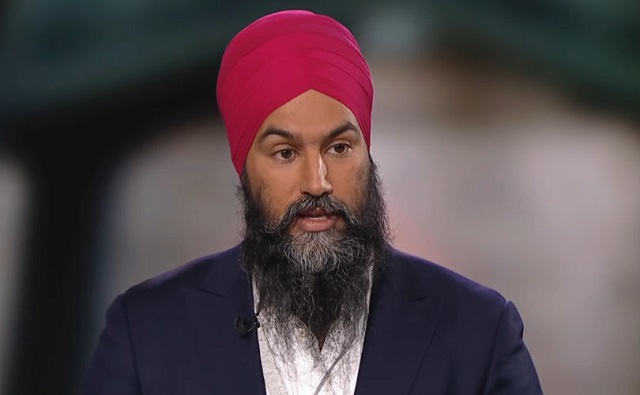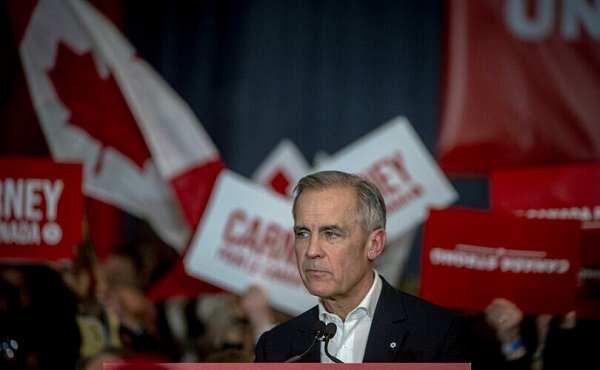Economy
NDP slated to back Conservative motion calling for nationwide pause on home heating carbon tax

From LifeSiteNews
‘The reality is we have people who are struggling to make ends meet— to heat their homes during the winter,’ NDP House leader Peter Julian told reporters Thursday, indicating the party’s support for the Conservatives’ motion.
In a rare turn of events, the New Democratic Party (NDP) is slated to vote in favor of a Conservative Party of Canada (CPC motion calling for a nationwide pause on the carbon tax applied to home heating fuel.
While the motion is non-binding, should the NDP vote in favor of the motion, it could force the federal government under Liberal Prime Minister Justin Trudeau to pause the tax for all Canadians, and could even open up the possibility of a future vote of non-confidence.
CPC MPs served a notice in the House of Commons that they will put to a vote, as early as this coming Monday, their motion which reads: “That given the government has announced a ‘temporary three-year pause’ to the federal carbon tax on home heating oil, the House call on the government to extend that pause to all forms of home heating.”
The motion was brought forth by CPC leader Pierre Poilievre on Tuesday of this week.
Trudeau announced last week he was pausing the collection of the carbon tax on home heating oil for three years, but only for Atlantic Canadian provinces. The current cost of the carbon tax on home heating fuel is 17 cents per liter. Most Canadians however heat their homes with clean-burning natural gas, a fuel which will not be exempted from the carbon tax.
Trudeau’s carbon tax pause for Atlantic Canada announcement came amid dismal polling numbers showing his government is likely to be defeated in a landslide by the Conservative Party come the next election.
Earlier this week, Poilievre dared Trudeau to call a “carbon tax” election so Canadians can decide for themselves if they want a government for or against a tax that has caused home heating bills to double in some provinces.
Trudeau claimed the Conservatives “still want to fight another election on denying climate change,” and that they are “wrong” as Canadians would vote Liberal again.
After he suggested Canadians would vote Liberal again, despite polls suggesting the party would lose badly if an election were called today, Poilievre hand gestured Trudeau to “bring it [an election].”
Trudeau has thus far rejected calls for giving carbon tax exemptions to other provinces.
NDP appears to support Conservative motion
The CPC’s motion appears to have the support of the NDP, an interesting development considering the deal they have with the Liberal Party. The Liberal Party has a minority government and formed an informal coalition with the NDP last year, with the latter agreeing to support and keep the former in power until the next election is mandated by law in 2025.
Yesterday, NDP House Leader Peter Julian told reporters, “The reality is we have people who are struggling to make ends meet— to heat their homes during the winter.”
“The panicked action of last week really needs to be adjusted so there are supports that go to people right across the country,” he said.
Julian added that Trudeau’s backtracking of the carbon tax for one region of the country is not fair for the rest of Canadians.
“It tends to disadvantage a lot of people,” he said.
Should the NDP vote in favor of the CPC motion, it should pass the House of Commons. It is unclear whether the Bloc Québecois are in favor of the motion.
Trudeau’s latest offering of a three-year pause on the carbon tax in Atlantic Canada has caused a major rift with oil and gas-rich western provinces, notably Alberta and Saskatchewan, and even Manitoba which has a new NDP government.
Saskatchewan Premier Scott Moe on Monday said his province will stop collecting a federal carbon tax on natural gas used to heat homes come January 1, 2024, unless it gets a similar tax break as the Atlantic Canadian provinces.
Alberta Premier Danielle Smith has said she will be looking into whether a Supreme Court challenge on the carbon tax is in order. She noted however that as Alberta has a deregulated energy industry, unlike Saskatchewan, she is not in a position to stop collecting the federal carbon tax.
LifeSiteNews reported earlier this month how Trudeau’s carbon tax is costing Canadians hundreds of dollars annually, as the rebates given out by the federal government are not enough to compensate for the increased fuel costs.
The Trudeau government’s current environmental goals – in lockstep with the United Nations’ “2030 Agenda for Sustainable Development” – include phasing out coal-fired power plants, reducing fertilizer usage, and curbing natural gas use over the coming decades.
The reduction and eventual elimination of the use of so-called “fossil fuels” and a transition to unreliable “green” energy has also been pushed by the World Economic Forum (WEF) – the globalist group behind the socialist “Great Reset” agenda – an organization in which Trudeau and some of his cabinet are involved.
Send an urgent message to Canadian legislators urging them to stop more online censorship laws
Bjorn Lomborg
The stupidity of Net Zero | Bjorn Lomborg on how climate alarmism leads to economic crisis

From spiked on YouTube
Note: This interview is focused on Europe and the UK. It very much applies to Canada. The 2025 Federal Election which will see Canadians choose between a more common sense approach, and spending the next 4 years continuing down the path of pursuing “The Stupidity of Net Zero”.
European industry is in freefall, and Net Zero is to blame.
Here, climate economist Bjorn Lomborg – author of Best Things First and False Alarm – explains how panic over climate change is doing far more damage than climate change itself. Swapping cheap and dependable fossil fuels for unreliable and expensive renewables costs our economies trillions, but for little environmental gain, Lomborg says.
Plus, he tackles the myth of the ‘climate apocalypse’ and explains why there are more polar bears than ever.
Support spiked: https://www.spiked-online.com/support/
Sign up to spiked’s newsletters: https://www.spiked-online.com/newslet…
Business
Scott Bessent Says Trump’s Goal Was Always To Get Trading Partners To Table After Major Pause Announcement


From the Daily Caller News Foundation
By
Secretary of the Treasury Scott Bessent told reporters Wednesday that President Donald Trump’s goal was to have major trading partners agree to negotiate after Trump announced a 90-day pause on reciprocal tariffs for many countries after dozens reached out to the administration.
Trump announced the pause via a Wednesday post on Truth Social that also announced substantial increases in tariffs on Chinese exports to the United States, saying 75 countries had asked to talk. Bessent said during a press event held alongside White House press secretary Karoline Leavitt that Trump had obtained “maximum leverage” to get trading partners to negotiate with the April 2 announcement of reciprocal tariffs.
“This was his strategy all along,” Bessent told reporters during an impromptu press conference at the White House. “And that, you know, you might even say that he goaded China into a bad position. They, they responded. They have shown themselves to the world to be the bad actors. And, and we are willing to cooperate with our allies and with our trading partners who did not retaliate. It wasn’t a hard message: Don’t retaliate, things will turn out well.”
Dear Readers:
As a nonprofit, we are dependent on the generosity of our readers.
Please consider making a small donation of any amount here.
Thank you!
WATCH:
China imposed retaliatory tariffs on American exports to the communist country Wednesday, imposing an 84% tariff on U.S. goods after Trump responded to a 34% tariff by taking American tariffs to 104%.
“Based on the lack of respect that China has shown to the World’s Markets, I am hereby raising the Tariff charged to China by the United States of America to 125%, effective immediately,” Trump said. “At some point, hopefully in the near future, China will realize that the days of ripping off the U.S.A., and other Countries, is no longer sustainable or acceptable.”
“They kept escalating and escalating, and now they have 125% tariffs that will be effective immediately,” Bessent said during the press conference.
Bessent said that China’s actions would not harm the United States as much as it would their own economy.
“We will see what China does,” Bessent said. “But what I am certain of, what I’m certain of, is that what China is doing will affect their economy much more than it will ours, because they have an export-driven, flood the world with cheap export model, and the rest of the world now understands.”
The Dow Jones Industrial average closed up 2,962.86 points Wednesday, with the NASDAQ climbing by 1,755.84 points and the S&P 500 rising 446.05 points, according to FoxBusiness.
-

 John Stossel2 days ago
John Stossel2 days agoGovernment Gambling Hypocrisy: Bad Odds and No Competition
-

 2025 Federal Election2 days ago
2025 Federal Election2 days agoMark Carney pledges another $150 million for CBC ahead of federal election
-

 Alberta2 days ago
Alberta2 days agoAlberta’s embrace of activity-based funding is great news for patients
-

 2025 Federal Election1 day ago
2025 Federal Election1 day agoCommunist China helped boost Mark Carney’s image on social media, election watchdog reports
-

 2025 Federal Election1 day ago
2025 Federal Election1 day agoFifty Shades of Mark Carney
-

 2025 Federal Election2 days ago
2025 Federal Election2 days agoDoes Canada Need a DOGE?
-

 2025 Federal Election2 days ago
2025 Federal Election2 days agoI don’t believe these polls!
-

 Justice1 day ago
Justice1 day agoCanadian government sued for forcing women to share spaces with ‘transgender’ male prisoners









